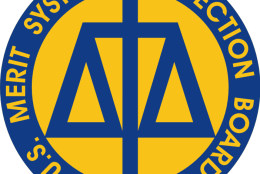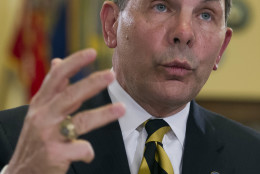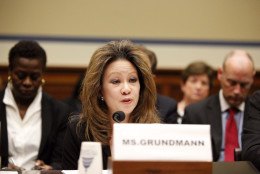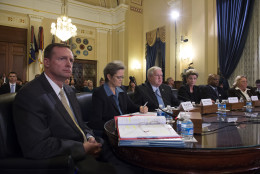Merit Systems Protection Board
-
Federal employee engagement has been studied extensively through the Office of Personnel Management's annual viewpoint study. Julie Osowski, senior research psychologist at Merit Systems Protection Board, tells Federal Drive with Tom Temin about MSPB's effort to look beyond the external factors that affect employee engagement.
March 28, 2016 -
There isn't much more the Veterans Affairs Department can do, now that the Merit Systems Protection Board overturned punishments for two of four senior executives accused of misconduct. The VA handed out lighter punishments to the four VBA leaders, despite criticism from Congress.
March 23, 2016 -
Accountability in the Senior Executive Service will be at the center of congressional discussions on a new omnibus legislative package for the Veterans Affairs Department. Senate VA Committee Chairman Johnny Isakson (R-Ga.) said he wants the VA and the committee to finish its work on the legislation by April 1.
March 16, 2016 -
A group of Republican senators criticized the Merit Systems Protection Board for overturning disciplinary actions taken against corrupt Veterans Affairs Department bureaucrats. The board and its array of administrative judges almost always uphold agency actions. Attorney Debra D'Agostino, partner at the Federal Practice Group, helps Federal Drive with Tom Temin sort things out.
March 14, 2016 -
The Merit Systems Protection Board processed nearly 30,000 cases in fiscal 2015, a 63 percent increase over 2014, according to an annual report.
March 03, 2016 -
Thanks to the flawed Choice Act Congress hastily passed in 2014, SESers exist in a sort of twilight of civil service protection.
March 03, 2016 -
John Palguta of the Partnership for Public Service has a command of the technical and legal complexities of federal employment. But he also has a feel for the human realities of being a public servant.
February 29, 2016 -
VA's processes for evaluating people are so messed up that leadership ends up living the legend that you can't do anything about federal employees no matter how badly they perform.
February 26, 2016 -
John Palguta spent 34 years in the federal government, before retiring as a member of the Senior Executive Service and director of policy at the Merit Systems Protection Board. For the last 16 years, he as been vice president for policy at the Partnership for Public Service. He talked to Federal Drive with Tom Temin about his last day on the job.
February 25, 2016 -
Senior leaders at the Veterans Affairs Department say the bill that was supposed to help them hold agency senior executives more accountable isn't working. Agency leaders are considering changes to the VA Access, Choice and Accountability Act of 2014 (Choice Act).
February 25, 2016 -
Monica Molnar, a senior associate with the Federal Practice Group, argues that Congress is focusing on the wrong solution when it comes to fixing the administrative leave process.
February 24, 2016 -
Susan Tsui Grundmann, chairwoman of the Merit Systems Protection Board, talks to Federal Drive with Tom Temin about how new legislation requiring greater accountability from Veterans Affairs managers affects the MSPB.
February 24, 2016 -
Kimberly Graves and Diana Rubens, who were reinstated to their positions as directors of the St. Paul and Philadelphia regional veterans benefits offices, could face another form of punishment, following the results of a second investigation from VA Deputy Secretary Sloan Gibson. The results of the investigation, which took longer than Gibson expected, should come in another week.
February 22, 2016 -
When Congress voted to restrict appeal rights of Veterans Affairs Department managers, it never counted on what might happen. Namely, that the Merit Systems Protection Board would follow the law to the letter. That's why a series of reversals have hit VA's senior leadership when it tried to fire people for performance. Lynn Bernabei, a partner at the law firm Bernabei and Cabot, which specializes in employee grievance cases, says VA has become a battleground between MSPB and Congress. She joined Federal Drive with Tom Temin with more details.
February 18, 2016 -
One prominent attorney believes MSPB is signaling to Congress it doesn't like the curtailment of employee civil rights.
February 18, 2016










